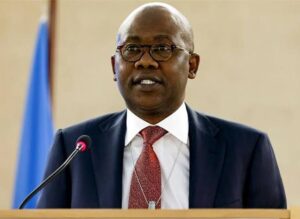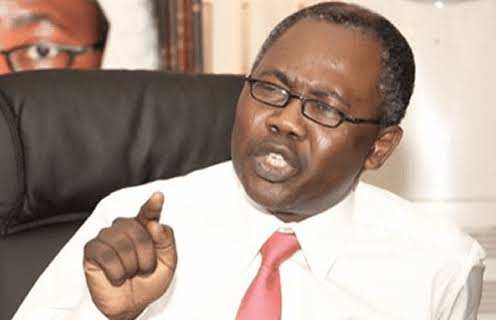Mohammed Bello Adoke, former Attorney-General of the Federation (AGF), has alleged that former President Muhammadu Buhari used the controversial OPL 245 case for personal and political vendettas. These claims are contained in Adoke’s forthcoming tell-all book titled “OPL 245: The Inside Story of the $1.3bn Nigerian Oil Block”, published by The Conrad Press in the UK and scheduled for unveiling in Abuja on Thursday.

Adoke asserts that Buhari, along with ex-Vice President Yemi Osinbajo, former AGF Abubakar Malami, some lawyers, and both local and international NGOs, manipulated the legal proceedings surrounding the OPL 245 oil deal to serve their own interests.
Background of the OPL 245 Deal
Oil Prospecting Lease 245 was initially awarded to Malabu Oil & Gas in 1998 by the military regime of Sani Abacha. In 2011, Malabu sold its interest to Shell and Eni for $1.1 billion, with an additional $210 million paid as a signature bonus to the Nigerian government. This transaction, however, triggered global investigations, with allegations that the $1.1 billion served as a covert bribe to Nigerian officials.
During Buhari’s tenure, criminal charges were brought against Adoke, who was AGF when the deal was finalized. Italian prosecutors similarly charged Shell, Eni, and Dan Etete, a former petroleum minister and key figure in the Malabu deal, in Milan. Additionally, Nigeria sought $1.7 billion in compensation from JP Morgan in the UK over the transfer of the deal’s proceeds.
Despite these actions, courts in Italy, the UK, and Nigeria found no evidence of corruption or wrongdoing. Investigations by U.S. and Dutch authorities were also dropped, and Adoke was acquitted of all related charges by two federal high courts in Abuja.

“A Grand Conspiracy”
In his book, Adoke describes the legal battle as a “grand conspiracy,” claiming it was politically motivated and orchestrated to settle personal scores.
“Everyone had a personal agenda,” he wrote. “There were those seeking to secure payouts for the Abacha family, others pursuing commissions from possible legal wins, and NGOs chasing recognition and grants for exposing what they called ‘the biggest corporate bribery scandal in history.’”
According to Adoke, Buhari sought revenge for his refusal to facilitate payment to Mohammed Sani (Abacha’s son), while Osinbajo wanted to demonstrate legal prowess by forcing Shell and Eni to pay billions in damages.
Osinbajo, acting as de facto AGF in the first six months of the Buhari administration, chaired the Presidential Committee on Asset Recovery (PCAR), which reportedly targeted $5.5 billion in recoveries. Adoke alleges that Osinbajo’s lawyer associate, Olabode Johnson, stood to gain commissions ranging from 5% to 35% on recoveries.
Adoke also accused Malami of leveraging his office to attack him, stating that Malami had previously worked for the Abacha family in the Malabu dispute and was eager to please both Buhari and his former clients.

Role of Global Witness and Foreign Prosecutors
The ex-AGF criticized UK-based NGO Global Witness for distorting the facts to fit a premeditated narrative. He claimed the group worked with Italian prosecutor Fabio De Pasquale, who had a personal vendetta against former Italian Prime Minister Silvio Berlusconi and was eager to prosecute Eni, with ties to the late politician.
Adoke wrote that in 2015, De Pasquale and other Italian prosecutors met with top Nigerian officials, including Osinbajo, the late Abba Kyari (then Chief of Staff), and EFCC representatives. These meetings allegedly laid the groundwork for Nigeria to aid the Italian prosecution.
“The strategy was simple,” Adoke explained. “Criminalize the Resolution Agreements that formed the basis of the OPL 245 deal. Once charges were filed against me, prosecutors could claim that the deal was corrupt and the AGF who approved it was guilty of misconduct.”

Coordinated Legal and Media Strategy
According to Adoke, the Buhari administration crafted a multi-layered strategy: the EFCC was to handle criminal prosecution, NGOs like HEDA Resource Centre and Global Witness would spearhead advocacy, while selected media outlets were tasked with running smear campaigns.
Part of the plan included Nigeria filing a civil case against JP Morgan in the UK for allegedly mishandling the transfer of $801 million to Malabu and demanding $1.7 billion in damages. Additionally, a separate lawsuit was to be filed against Shell and Eni to reclaim the $1.1 billion paid to Malabu.
“The goal was to criminalize the deal entirely and make it easier to justify the government’s legal actions,” Adoke concluded. “It was a coordinated assault designed to support an international prosecution built on shaky grounds.”
The public presentation of Adoke’s book will be broadcast live on Channels TV at 11am on Thursday.




